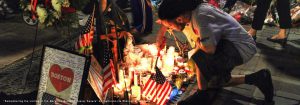An Interview via mail was conducted with a redditor, who took part in the crime investigation of the Boston bombings. The person wishes to stay anonymous.
What was your part/role when it comes to the crowdsourced investigation of the Boston bombings?
I thought it was interesting to examine what little facts were known about the suspects and their act, and to see if I could somehow come to new info/conclusions. At one point I identified one of the bombers on a random photo posted on a forum about running by a witness of the bombings. I was able to identify him by connecting other facts and images together about his possible location and clothing. At that time the police was still openly looking for both suspects and no clearer picture was yet posted on reddit. I was contacted by ABC news after that through Reddit. I explained that I only found the image on a forum and that it was not me but a David Green who took the picture. I liked the idea that my efforts perhaps contributed in identifying one of the bombers earlier than if it was only the police working on it.
What were your motivations for contributing to the search for the Boston bomber?
- Being the first to find new facts.
- Enjoying the process of using creativity and analytical skills on existing facts to investigate and uncover new information.
- Being able to help and do good.
- Strong curiosity into finding out what happened and took place that day. It started by seeing video footage of the marathon turning into an attack.
Do you have any experiences or special interest in journalism?
I do not have previous experience in journalism, but always felt it could have been a career choice. Finding out the truth and handing it to others attracts me.
Did you tell any of your relatives or friends about your contribution to the search? And if yes, what were their reactions? Was it more positive or negative?
I did tell my partner. She found it a bit nerdy and time consuming, but was generally positive about trying to help and contribute to the search.
Did your life change in any way? Did you put your new interest into career choices?
At that time I was a manager at a large American multinational, and happened to have a few days off when this happened. I since then moved on to a higher position and enjoy my work too much to consider changing my career. It did make me very aware that journalism can now come from anyone experiencing or investigating an event, and how powerful this might become.
Did you believe the information that was distributed from other redditors?
Based on many hours of fact finding and analysis from other redditors, I could generate more new facts and findings, which in turn enables others to do the same. If you have a community like Reddit, with millions of active members, and a big part of the community is contributing so that something usefully is bound to turn up. I did not believe any of the information necessarily, but would look at any new information posted to evaluate, if it would contain anything usable.
Whilst looking for the missing Malaysian plane, the Tool Tomnod was used. Were there any tools like this in the Boston bomber-search?
And if yes, what tool would you say was the most effective?
I do not recall any such tools being used, but a tool to browse and see all potentially relevant info released by law enforcement would help.
If something similar would happen again, would you contribute to the search again? Would you do anything different?
If I happen to have the time I would contribute to the search again. I would be a bit more conscious of misinformation perhaps.
Do you think that the government should implement a crowd-based system so that they can use the force of the crowd for investigations?
Just like the Amber alert, I think the government can implement such a system. For example a dedicated website to enable crowd based investigation on carefully selected information, such as photo, video and other potential clues, to simply use the force of the crowd to come closer to solving a case.
Interview mit Mag. Thomas Gegenhuber

Join the conversation